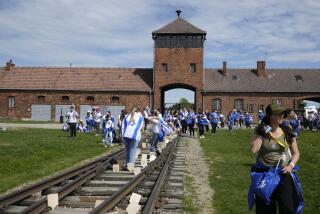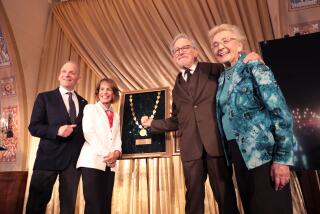Turning Painful Pages of History : Education: Two-day UCI symposium focuses on mass killings worldwide. Genocide is not a thing of the past, one student says.
- Share via
IRVINE — Behind the closed doors of his home in Armenia, Aram Chaparyan would listen to his great-grandmother recount the painful memories: how her family was killed before her eyes, how her little brother was trampled by a horse as he marched to a deportation camp, how her mother was taken by soldiers and never seen again.
Chaparyan listened carefully because he knew the Communists did not allow this history to be taught in schools. And he listened carefully because he knew that one day his 98-year-old great-grandmother would not be alive to tell her story.
Now, seven years after Chaparyan’s family emigrated from Armenia, the freshman political science major is doing his part to tell his country’s unofficial history as one of the student organizers of UC Irvine’s symposium on worldwide genocide.
“All that I have learned has been from my family, and as we go into the 21st Century the survivors of genocide are perishing,” 18-year-old Chaparyan said. “If we don’t do something today, we won’t have an older generation to pass on the history.”
The two-day event began Tuesday with a series of panels and speakers who discussed atrocities in Armenia, Kurdistan and Germany and will continue today with presentations on the Japanese internment and contemporary genocide in Rwanda, Cambodia and Bosnia.
The event, in its second year, is especially poignant, organizers said, because it marks the 80th anniversary of the Armenian genocide and the 50th anniversary of the liberation of concentration camps in Nazi Germany.
UCLA lecturer Rubina Peroomian spoke to an audience of about 65 on the parallels in historical circumstances, ideology and execution methods between the Armenian and Jewish experience.
“The ideology of the Nazis was about the purification of their race, and that was quite similar to the Turks who wanted to get rid of the minorities and create homogeneity in terms of race and religion,” said Peroomian, who is Armenian and emigrated from Iran in 1978.
The Turkish massacre of the Armenians in 1915 took the lives of 1 1/2 million and left another half a million mutilated, diseased or displaced, historians say.
In the genocide against Armenians and Jews, the executors used the most economical and efficient methods of mass murder, Peroomian said.
“The Nazis had the gas chambers. The Ottoman Empire used death marches that would last five months and would starve the Armenians as they marched round and round without a destination.”
Many in the audience, which included students and non-students, were immigrants from war-torn countries who debated historical points.
“It is nice to get together with different ethnic groups to exchange ideas and establish a solidarity in the struggle,” said Tinue Shad, 63, who was a guerrilla in Kurdistan 20 years ago. “We took advantage of this in order to present our view.”
Student organizers, including the Armenian Student Assn., UCI Hillel and Model United Nations, said their goal was to ensure that the legacy of genocide throughout the world is not forgotten.
“We organized this event so that people will wake up and see that holocausts and genocide are not a thing of the past,” Chaparyan said. “They are happening right now and are a thing of the future.”
More to Read
Sign up for Essential California
The most important California stories and recommendations in your inbox every morning.
You may occasionally receive promotional content from the Los Angeles Times.













